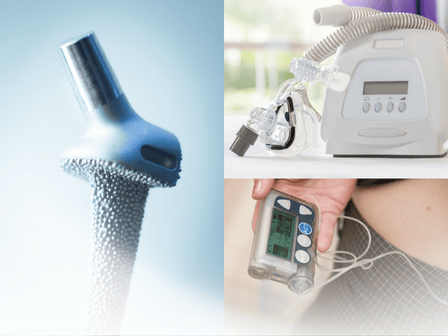How Do Recalls, Proof and Compensation Work for Defective Medical Devices?
When a medical device fails, the impact can be devastating. Whether it’s a hip implant, hernia mesh, insulin pump, or CPAP machine, you trusted that device to make your life better — not worse. Unfortunately, many patients discover too late that their pain, infection, or complications traces back to defective media devices.
If you’re searching for “defective medical device attorneys near me” or “recall lawyers near me”, understanding how these cases work — and what records matter — can help you protect your rights.
What Are Common Defective Medical Devices Cases?
At Shannon Law Group, we handle a wide range of injuries caused by defective medical devices, including:
Hip and knee replacements (loosening, metallosis, or fractures)
Hernia mesh (adhesions, infections, bowel obstruction)
Insulin and pain pumps (malfunction, over- or under-delivery)
CPAP and BiPAP machines (foam breakdown, chemical exposure, cancer risk)
IV filters, spinal implants, and defibrillators (migration, breakage, or electrical failure)
Each case starts with the same question: Was the device safe, and did it perform as the manufacturer promised?
What Does a Medical Device Recall Mean — and Doesn’t?
When a medical device is recalled, it means the manufacturer or the FDA identified a safety problem. But a recall does not automatically guarantee compensation. Some recalls are voluntary, others are limited to certain batches or model numbers. However, if you have been injured by a product that has been recalled, there is a strong likelihood that you have a case.
A recall may strengthen your case, but to succeed, you still need to prove:
You were injured
The device was defective or unreasonably dangerous; and
The defect directly caused your harm.
That’s why gathering the right documentation is crucial.
What Records Should I Request for My Defective Medical Devices Case?
Whether you’ve had revision surgery or still have the implant in place, your medical records tell the story. Start by gathering:
Implant stickers or product labels – These include the UDI (Unique Device Identifier), model number, and lot/serial number.
Operative reports – Especially the implant and explant reports.
Pathology and imaging records – Showing device position, migration, or infection.
Defective medical device recall letters – From the manufacturer, hospital, or the FDA.
These documents allow your legal team — and your pharmacy or biomedical expert — to trace exactly which product was used, when it was manufactured, and whether it’s linked to known failures.
Why Is Expert Testimony Important in Defective Medical Devices Cases?
Defective medical devices claims often rely on expert witnesses — engineers, biomedical specialists, surgeons, and pharmacologists — who can connect your injuries to the device’s defect. They analyze how and why the failure occurred, comparing it to medical literature and recall data.
At Shannon Law Group, we coordinate with leading experts to prove causation clearly and convincingly — whether it’s a mechanical failure, a toxic exposure, or a manufacturing flaw.
What Are the Settlement Drivers in Defective Medical Devices Cases?
The value of a defective device claim depends on the severity and permanence of the injury, including:
Revision surgeries – Multiple operations or hardware removal.
Infection or sepsis – Long-term antibiotics, hospitalizations.
Lost wages or disability – Missed work or reduced earning capacity.
Future care needs – Rehab, mobility aids, or lifelong medication.
Economic losses and pain and suffering both matter. A strong case ties these damages directly to the defective device and the company that made or sold it.
What Should Be My Next Step With My Defective Medical Device Injury? Get Answers
If you believe a defective medical device caused your injury, don’t wait for another recall notice or company apology.
📁 You can securely upload your device records for a free review. Our attorneys will examine your implant data, recall history, and medical outcomes to determine whether you have a viable case.
👉 Contact Shannon Law Group for a secure upload portal invitation or contact us for a free case evaluation. Call us at 412-204-7103 or click and complete the form at the bottom of our homepage.
You trusted the device. Now, trust us to hold its makers accountable.


